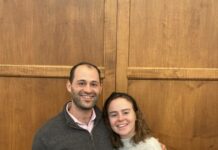
This year, 5782, is a Jewish leap year, where a second month of Adar is added to the calendar, creating another roomy 30 days in the year.
For a kid, this is like adding an extra July to the calendar, a prospect of another full month of summer camp, time down the shore or numbing the brain in front of a television screen.
For rabbis, however, this summer period — though it is a buffer between the major holidays of Shavuot and Rosh Hashanah — is less spacious. Though many spiritual leaders take a break over the summer, finding time to mentally and emotionally recharge is a difficult task.
Breaks aren’t out of the question: Clergy-led Shabbat services are in a lull over the summer at Mishkan Shalom in Philadelphia, with Rabbi Shawn Zevit leading one Shabbat service a month; that allows him to take time to grab a break and take care of his grandchildren who stay with him and his wife for a week. The Reconstructionist synagogue is also moving services to Zoom for the season, allowing more people to attend at their leisure and taking pressure off of volunteer greeters.
But for other synagogues, work continues despite religious and preschools going dormant for the season. Marlton, New Jersey-based Congregation Beth Tikvah Rabbi Nathan Weiner is hard at work on next year’s curriculums. He also does programming for the JCC Camps at Medford’s first week at the end of June. When he’s not onboarding the synagogue’s new employee, he’s planning simchas for Shabbat and outlining pamphlet content for the High Holidays.
Rabbi Abe Friedman of Philadelphia’s Temple Beth Zion-Beth Israel is planning for Rosh Hashanah, too, hoping to have the bulk of the work done by the time he takes his vacation to his wife’s family’s house in the Berkshires in western Massachusetts.
For rabbis, these breaks are necessary. But because of the ongoing work during the summer, a trip away has to be intentional.
“You have to make Shabbos,” Weiner said.
In Jerusalem, before the calm of Shabbat, it’s calamity, Weiner said. To observe Shabbat, there’s immense planning that has to take place. The same is true of a vacation.
Friedman doesn’t check his email during his vacation. Until a couple of years ago, the family vacation home didn’t even have internet. He takes the same attitude for his days off on Tuesdays, choosing to set clear work boundaries.
“I am no more willing to compromise it than I would be to compromise the actual Shabbat,” he said.
But creating boundaries, particularly in the age of technology, has proven difficult for some rabbis.
“It’s very important and impossible” to set boundaries as a rabbi, Maple Glen-based Congregation Beth Or Rabbi Gregory Marx said.
“There’s always somebody in need in a congregation,” he said. “And I always feel that sense of, ‘Oh, I really should be calling this person,’ and so that sense of obligation and mitzvah is always hovering.”
Per his wife’s suggestion, Marx tries to only check his emails for 30 minutes in the mornings and evenings. He tries to respectfully turn down requests for Zoom meetings.
Increased access to technology and remote communication has coincided with the pandemic, which has brought another challenge to rabbis. The past two years have been an intense time of emotional turmoil, where people are increasingly turning to spiritual leaders for guidance, Rabbi Kami Knapp Schechter of Congregation Or Shalom in Berwyn argued.
There’s an “immense amount of pressure that’s on the rabbis right now of constantly having to reinvent things and constantly having to be the cheerleader and holding the community together,” Knapp Schechter said. “On top of also stepping in for first-line responders who are also overwhelmed — so like, therapists and doctors and chaplains, all these people who are spread super-thin — we’re having to step up and kind of fill some of those holes.”
Even before the pandemic, rabbis had trouble taking breaks, Knapp Schechter argued. The nature of the job requires immense emotional fortitude and patience.
“I don’t think we really know how to refill our cups,” she said. “We’re trying to force ourselves to take breaks. We’re trying to give ourselves permission to take breaks. But it’s really hard, especially when you feel like your community really needs you.”
As rabbis work to flex their boundaries and make the most of their vacations, they’re also putting feelers out, sharing their needs with their leadership team, trying to subtly share their experiences with their community without placing their baggage on congregants.
“It’s a hard thing to figure out because you, as a rabbi, you want to put on the best face for your community. And you want to give them hope and give them inspiration,” Knapp Shechter said. “So there’s a fine line between trying to do that but also being a human being and being authentic about what your experiences are.”






